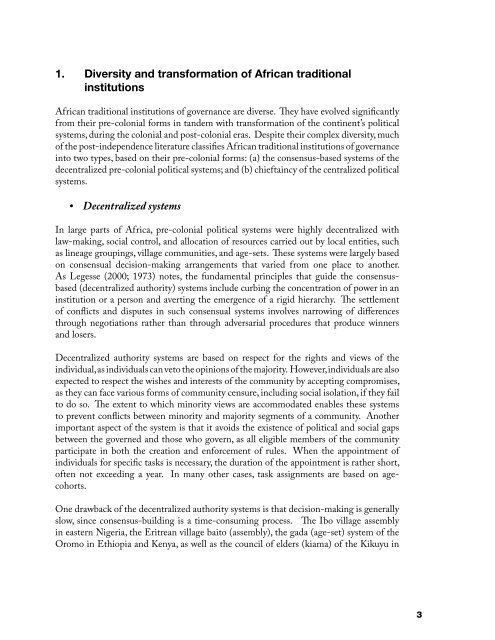Relevance of - United Nations Economic Commission for Africa
Relevance of - United Nations Economic Commission for Africa
Relevance of - United Nations Economic Commission for Africa
Create successful ePaper yourself
Turn your PDF publications into a flip-book with our unique Google optimized e-Paper software.
1. Diversity and trans<strong>for</strong>mation <strong>of</strong> <strong>Africa</strong>n traditional<br />
institutions<br />
<strong>Africa</strong>n traditional institutions <strong>of</strong> governance are diverse. They have evolved significantly<br />
from their pre-colonial <strong>for</strong>ms in tandem with trans<strong>for</strong>mation <strong>of</strong> the continent’s political<br />
systems, during the colonial and post-colonial eras. Despite their complex diversity, much<br />
<strong>of</strong> the post-independence literature classifies <strong>Africa</strong>n traditional institutions <strong>of</strong> governance<br />
into two types, based on their pre-colonial <strong>for</strong>ms: (a) the consensus-based systems <strong>of</strong> the<br />
decentralized pre-colonial political systems; and (b) chieftaincy <strong>of</strong> the centralized political<br />
systems.<br />
• Decentralized systems<br />
In large parts <strong>of</strong> <strong>Africa</strong>, pre-colonial political systems were highly decentralized with<br />
law-making, social control, and allocation <strong>of</strong> resources carried out by local entities, such<br />
as lineage groupings, village communities, and age-sets. These systems were largely based<br />
on consensual decision-making arrangements that varied from one place to another.<br />
As Legesse (2000; 1973) notes, the fundamental principles that guide the consensusbased<br />
(decentralized authority) systems include curbing the concentration <strong>of</strong> power in an<br />
institution or a person and averting the emergence <strong>of</strong> a rigid hierarchy. The settlement<br />
<strong>of</strong> conflicts and disputes in such consensual systems involves narrowing <strong>of</strong> differences<br />
through negotiations rather than through adversarial procedures that produce winners<br />
and losers.<br />
Decentralized authority systems are based on respect <strong>for</strong> the rights and views <strong>of</strong> the<br />
individual, as individuals can veto the opinions <strong>of</strong> the majority. However, individuals are also<br />
expected to respect the wishes and interests <strong>of</strong> the community by accepting compromises,<br />
as they can face various <strong>for</strong>ms <strong>of</strong> community censure, including social isolation, if they fail<br />
to do so. The extent to which minority views are accommodated enables these systems<br />
to prevent conflicts between minority and majority segments <strong>of</strong> a community. Another<br />
important aspect <strong>of</strong> the system is that it avoids the existence <strong>of</strong> political and social gaps<br />
between the governed and those who govern, as all eligible members <strong>of</strong> the community<br />
participate in both the creation and en<strong>for</strong>cement <strong>of</strong> rules. When the appointment <strong>of</strong><br />
individuals <strong>for</strong> specific tasks is necessary, the duration <strong>of</strong> the appointment is rather short,<br />
<strong>of</strong>ten not exceeding a year. In many other cases, task assignments are based on agecohorts.<br />
One drawback <strong>of</strong> the decentralized authority systems is that decision-making is generally<br />
slow, since consensus-building is a time-consuming process. The Ibo village assembly<br />
in eastern Nigeria, the Eritrean village baito (assembly), the gada (age-set) system <strong>of</strong> the<br />
Oromo in Ethiopia and Kenya, as well as the council <strong>of</strong> elders (kiama) <strong>of</strong> the Kikuyu in
















